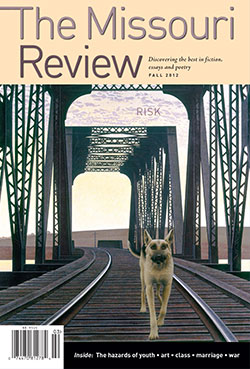Interviews | December 10, 2012
A Conversation with T.R. Hummer
Andrew McFadyen-Ketchum
A poem is a score for consciousness (“score” as in “musical score”). In textual terms, consciousness conveys itself as what fiction writers call “point of view.” So far so good. I believe less in the absolute separation of the various points of view, however: first person and third person are manifestations of the same thing: consciousness per se. Therefore, I work as though every third-person text is simply a first-person text in which no one has (yet) said “I” but could at any moment. I also work as though every poem, whatever its preponderant pronoun, is in fact (à la Whitman) a groping for omniscience, the manifestation of a desire to forgive everything and therefore to know everything.
This interview is not currently available online.
If you are a student, faculty member, or staff member at an institution whose library subscribes to Project Muse, you can read this piece and the full archives of the Missouri Review for free. Check this list to see if your library is a Project Muse subscriber.
Want to read more?
Subscribe TodaySEE THE ISSUE
SUGGESTED CONTENT

Features
Apr 16 2024
A Conversation with Carl Phillips
A Conversation with Carl Phillips Carl Phillips is the author of sixteen books of poetry, most recently Then the War: And Selected Poems 2007-2020 (Carcanet, 2022), which won the 2023… read more

Features
Jan 08 2024
A Conversation with Andrew Leland
A Conversation with Andrew Leland Andrew Leland’s writing has appeared in The New York Times Magazine, The New Yorker, McSweeney’s Quarterly, and The San Francisco Chronicle, among other outlets.… read more

Interviews
Jun 02 2021
A Conversation with Camille T. Dungy
A Conversation with Camille T. Dungy Jacob Griffin Hall Camille T. Dungy is a poet, essayist, professor, and editor based in Fort Collins, Colorado. She is the author of four… read more

